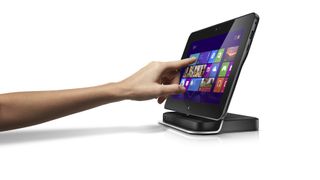Dell bangs drum for Windows 8 tablets
Executive says that it does the job for business

A question mark hangs over the long term prospects for Windows 8 tablets in the workplace.
Research and advisory firm Forrester has predicted, in its 2013 Mobile Workforce Adoption Trends report, that Windows 8 will account for 30% of business users for tablets. Meanwhile Bloomberg estimated that Microsoft had sold 400,000 of its Surface Pro models in the weeks following its launch, a figure which some have portrayed as a slow start.
Margaret Franco, Dell's Executive Director of End User Computing, is one of those with an upbeat view of the future for Windows 8 tablets.
"By 2016, there will be 760 million tablets on the market; that's almost one for every 10 people around the globe," Franco points out. She believes that plenty of those will be running Windows as they can use them for work effectively, without losing out on the reasons people like a tablet.
"Users are really embracing the Latitude 10 tablet and Windows 8, not just because it's Windows 8 but because the IT folks can put onto those devices the business apps those users really, really value."
Key work tools
She calls out key work tools that are easier to use from a Windows tablet; SharePoint and other file servers, email access with full-powered email software like Outlook, and being joined to the domain and the office network.
But the key is doing that on a device users like and can also have fun with.
Get daily insight, inspiration and deals in your inbox
Get the hottest deals available in your inbox plus news, reviews, opinion, analysis and more from the TechRadar team.
"For a user to be effective, they want to have one device for their business life as well as their personal life," she says. "Windows 8 tablets give them the best of both worlds. You can do what you need inside the intranet and in your personal life. That's what delights these users and makes them receptive."
Dell has placed more of an emphasis on including business features in its tablets that some of its competitors. The enterprise version of the Dell Latitude 10 has a built-in smart card and fingerprint reader, and even the standard model has a removable battery that lasts all day – and an optional extended battery that keeps going for up to 20 hours.
Franco also mentions the Latitude 14-inch Ultrabook, claiming it has features that consumers want but that it can integrated into the business environment.
It's possible to beef up the security features of Windows 8 with services such as Dell Data Protection which "allows data to be encrypted and not just with file level protection". This makes it possible to secure data in a personal account or inside a managed network.
Unlike other tablets, a Windows 8 model is still a PC – something businesses already know how to deal with, she points out.
"A lot of tablets chosen today are brought into companies without regards to IT at all. (They can't access business resources) so they're really secondary devices for users.
"There hasn't been a really robust solution IT managers can embrace and take to users that is secure and manageable. Windows 8 allows us to really put together an offering like that. Windows 8 enables IT managers to easily integrate devices into their network and provide highly mobile functionality to users."
Franco suggests the concept of work has changed over the last five years. "Work is no longer a destination. Work is an activity and users want to have access to that at any time," she says (drawing on the responses to Dell's Evolving Workforce Study).
That means they want access on the devices they're comfortable with. "Employees prefer - and believe they can be more effective as a human being - if they have control over what types of device they use and when they will be able to do their work."
Work and personal
Does that mean people are simply working more hours, or is it more that work and personal life are blending together? It's a complex question but Franco points out, this flexibility is something employees get a benefit from as well as their companies.
Another change that could help Windows 8 is that more of the technology that companies are buying will be ordered and paid for directly by business teams rather than format IT departments.
"We see that in our discussions with IT teams," Franco confirms. "They're aware that ultimately they have to provide a return on investment to the line of business team.
"What underlies this is a shifting of budget parameters. So much of the budget has been focused on keeping the lights on and IT is feeling more and more pressured.
"They need to have a budget that's focused on innovation and driving productivity, not only reducing cost. They have to create a value proposition around productivity and very secure data."
Mary (Twitter, Google+, website) started her career at Future Publishing, saw the AOL meltdown first hand the first time around when she ran the AOL UK computing channel, and she's been a freelance tech writer for over a decade. She's used every version of Windows and Office released, and every smartphone too, but she's still looking for the perfect tablet. Yes, she really does have USB earrings.
Most Popular
